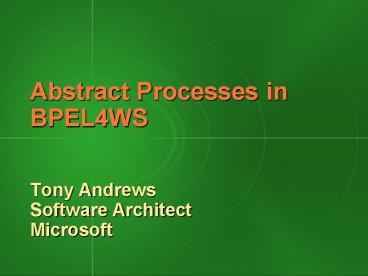Abstract Processes in BPEL4WS - PowerPoint PPT Presentation
1 / 13
Title:
Abstract Processes in BPEL4WS
Description:
Is my behavior the same as (or an acceptable subset of) the specification I started from? ... promote separation of concerns between 'process' and 'implementation' ... – PowerPoint PPT presentation
Number of Views:11
Avg rating:3.0/5.0
Title: Abstract Processes in BPEL4WS
1
Abstract Processes in BPEL4WS
- Tony Andrews
- Software Architect
- Microsoft
2
Agenda
- Overview
- Scenarios
- Features Rationale
- Issues
3
Abstract Processes
- Description of public behavior
- If WSDL is vocabulary, BPEL is grammar
- Independent of implementation
- Just as WSDL doesnt require use of a particular
language - Permits data-dependent behavior
- Message types arent always enough
- Limited expressive power
- Facilitates use of well-known techniques for
static analysis - Impact of private aspects on public behavior can
be contained - via non-determinism (i.e. opaque assignment)
4
Executable vs. Abstract
Portability
Interoperability
Executable
Abstract
BPELa
BPELe
BPEL4WS Core Concepts
XPath
others...
WSDL
5
Scenarios for BPELa
- Code first (inside-out)
- Extract abstract behavior (BPELa) from
- existing process implementation (manual)
- BPELe (automatic or semi-automatic)
- Build partner behavior(s) by inspection of my
behavior - Difficult to automate, in general
- Protocol first (outside-in)
- Use BPELa as a tool for rapid design, prototyping
and verification - Build executable skeleton from abstract processes
(BPELa ? BPELe )
6
Use cases
- Heres how I behave work with me!
7
Key questions we can ask
- Are (two or more) abstract processes mutually
compatible? - Does a process implementation conform to a
specification of public behavior?
8
Compatibility
- System is guaranteed robust
- All parties terminate successfully under all
conditions - No un-processed messages
- No exceptions possible
- Exceptions in BPELe are more like assertion
failures here - No invalid request/response sequences
9
Conformance
- Does my implementation satisfy the abstract
behavior I used as a template? - Is my behavior the same as (or an acceptable
subset of) the specification I started
from?(Does my implementation refine my
specification?)
10
How expressive is BPELa?
- Rich control flow with arithmetic operations on
message data, but... - Access to message data is limited
- Operations on data are restricted to...
- promote separation of concerns between process
and implementation - facilitate static analysis
11
Opaque assignment
- Captures the net outcome of some complex or
private computation - Abstraction of implementation details
- Two usage styles
- Constrained targets like a dice roll
- Select from a reasonably bounded set of
alternatives - Unconstrained targets like a UUID
- Useful for modeling the creation of correlation
keys
12
Changes in 5/5 draft
- Simpler syntax
- No need to declare message variables when not
otherwise required - Makes simple processes clearer and more concise
- Opaque assignment expanded
- Unconstrained (but simple) types now supported
- Required by the simplified syntax (above)
- boolean permitted as target (mistakenly omitted
in earlier versions)
13
(No Transcript)































